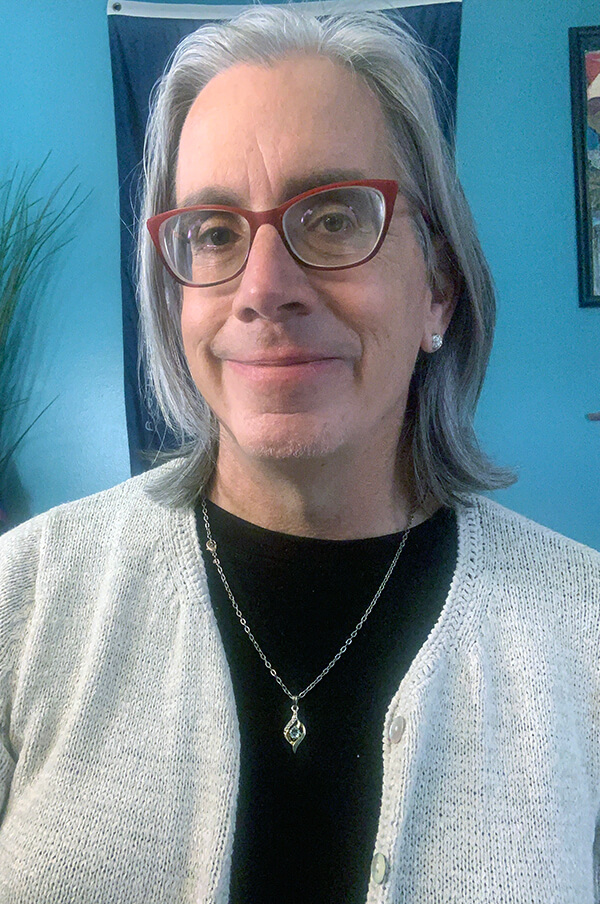Key points:
- Nearly 1,000 anti-trans laws have been proposed this year across the United States, and transgender people have become the target of national politics.
- At the same time, United Methodist churches are opening their doors wider, and the denomination has removed anti-LGBTQIA+ language from its polity.
- The Reconciling Ministries Network and the United Methodist Alliance for Transgender Inclusion are working to help the church become more inclusive.

Photo courtesy of the author.
Commentaries
As followers of Jesus, we live with one foot in the world and one foot in the church. As followers of Wesleyanism, our personal holiness shapes our social witness. This can result in living in conflicting spaces at the same time.
As a United Methodist transgender pastor, I find myself in a church that is more inclusive of LGBTQIA+ people than it has ever been. At the same time, people like me have become the target and scapegoat of U.S. politics.
Already this year, 969 anti-trans laws have been proposed in 49 states, and as well as nationally. State legislatures have passed laws banning gender-affirming care, prohibiting transgender students from school sports and erasing the existence of nonbinary people. In the 2024 election campaigns, Republicans spent over $200 million on anti-trans ads and Democrats blamed focus on transgender rights for election results. That same year, The United Methodist Church’s General Conference removed harmful language from its Book of Discipline that labeled LGBTQIA+ people as incompatible with Christian teaching.
We live in two cultures, one where transgender people are being legislated out of public life, and another where faith communities are opening their doors wider than before.
This summer, more than 200 worldwide members of the Reconciling Ministries Network gathered for its 2025 Convocation. The group celebrated how it nurtured coalitions that brought about the legislative changes of 2024. From that model, Derrick Luruth Scott III, co-lay leader of the denomination’s Florida Conference, challenged the assembled to use their spectrum of gifts to build a more just and inclusive church.
One manifestation of this vision is the United Methodist Alliance for Transgender Inclusion, an extension of the Reconciling Ministries Network. Before Convocation, the alliance consisted of a Facebook page and a handful of people who shared a sacred dream of doing more. At Convocation, 15 gender-diverse people gathered to name what inclusion would look like and the gifts each of us offered to make that vision happen.
We dreamed of a church that will be a place of belonging, healing and celebration for transgender and nonbinary people. A church where transgender people can safely live into their God-given identities and callings with dignity and joy.
The alliance doesn’t exist to beg for inclusion; it exists to proclaim it. Its work is rooted in the belief that transgender people are already whole, already beloved and already called by God.
The United Methodist Alliance for Transgender Inclusion holds sacred space for transgender United Methodists to find connection, build mutual support and advocate for justice.
For over 40 years, the Reconciling Ministries Network has organized United Methodist individuals and communities to resist discrimination and work toward full inclusion of LGBTQIA+ people in the church. With its network of reconciling churches, communities and campus ministries across the world, the organization is building a broad-based movement that sees gender justice as core to the Gospel. Educational resources, advocacy campaigns and national gatherings provide platforms for transgender United Methodists to lead and be heard.
The Rev. Andi Woodworth, pastor of Neighborhood Church in Atlanta, embodied this practice as she preached at Convocation about the church being the place where disenfranchised people can find home.
Subscribe to our
e-newsletter
In 2025, Reconciling Ministries launched a new strategic plan focused on becoming the primary LGBTQIA+ resource hub within the denomination. The first of its four goals is to equip faith communities with tools to engage in the work of intersectional justice including anti-racism, disability justice and transgender inclusion. This is not a surface-level rainbow welcome. It’s a deep-rooted commitment to becoming the body of Christ that reflects the diversity of God’s creation.
In a world where schools are banning books about gender identity and politicians are using transgender people as scapegoats for cultural fear, the work of the alliance and Reconciling Ministries is prophetic. We are building sanctuaries in the storm, places where transgender people can come not just to survive, but to thrive. Worship spaces where pronouns are respected. Pulpits where gender-expansive preachers proclaim the Word. Baptismal waters where transgender people are named. These are not distant dreams; they are happening, and the movement is growing.
Despite the historic work of last year’s General Conference, The United Methodist Church still has work to do. Nonetheless, what is happening is resurrection, a rising from the ashes of political exclusion toward a future of sacred belonging.
For transgender people feeling vulnerable from political assaults, The United Methodist Church, through the work of the alliance and Reconciling Ministries, is becoming the home that Rev. Woodworth envisioned in her sermon. The church is the place where we are not seen as problems to be solved, but as beloved children of God to be celebrated. As the nation hardens its laws, the Spirit softens our hearts. Where the world says “No,” the church says “Welcome.”
The road is long. The backlash is real. Yet, this is a Pentecost moment in the United Methodist movement. At its center is the voice of a diverse God who is inviting the church not just to include us, but to listen to our good news.
Henneman is the senior pastor of the United Methodist Church for All People in Columbus, Ohio.
News media contact: Julie Dwyer and Heather Hahn at [email protected]. read more United Methodist news, subscribe to the free UM News Digest.




